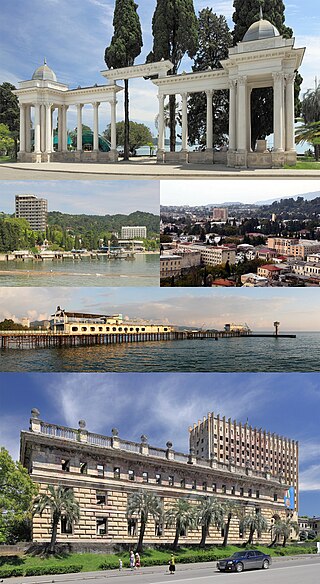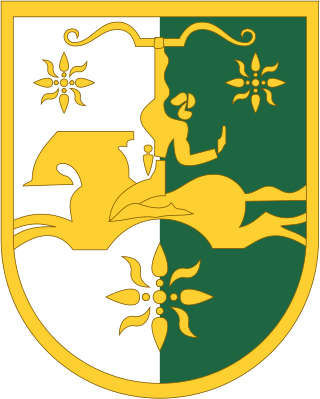 |
|---|
| Constitution |
Indirect presidential elections were held in Abkhazia for the first time on 26 November 1994. [1] Vladislav Ardzinba was elected President, and was inaugurated on 6 December. [2]
 |
|---|
| Constitution |
Indirect presidential elections were held in Abkhazia for the first time on 26 November 1994. [1] Vladislav Ardzinba was elected President, and was inaugurated on 6 December. [2]

The Abkhaz–Georgian conflict involves ethnic conflict between Georgians and the Abkhaz people in Abkhazia, a de facto independent, partially recognized republic. In a broader sense, one can view the Georgian–Abkhaz conflict as part of a geopolitical conflict in the Caucasus region, intensified at the end of the 20th century with the dissolution of the Soviet Union in 1991.
Abkhazia is a region in the Caucasus that is under the effective control of the partially recognised self-declared Republic of Abkhazia. The de jure majority internationally recognized Autonomous Republic of Abkhazia claims to be its legitimate government.

Sukhumi or Sukhum, also known by its Georgian name Sokhumi or Abkhaz name Aqwa, is a city in a wide bay on the Black Sea's eastern coast. It is both the capital and largest city of the Republic of Abkhazia, a partially recognised state widely recognized as a part of Georgia. The city has been controlled by Abkhazia since the Abkhazia war in 1992–93. The city, which has an airport, is a port, major rail junction and a holiday resort because of its beaches, sanatoriums, mineral-water spas and semitropical climate. It is also a member of the International Black Sea Club.
The Government of the Autonomous Republic of Abkhazia is an administration established by Georgia as the legal and only government of Abkhazia. Abkhazia has been de facto independent of Georgia – though with limited international recognition – since the early 1990s. Ruslan Abashidze, elected in May 2019, is the current head of the government-in-exile.

New Athos or Akhali Atoni is a town in the Gudauta raion of Abkhazia situated some 22 km (14 mi) from Sukhumi by the shores of the Black Sea. The town was previously known under the names Nikopol, Acheisos, Anakopia, Nikopia, Nikofia, Nikopsis, Absara, and Psyrtskha.

The history of Abkhazia, a region in the South Caucasus, spans more than 5,000 years from its settlement by the lower-paleolithic hunter-gatherers to its present status as a partially recognized state.

Parliamentary elections were held in Abkhazia on 4 March 2007, with a second round in seventeen constituencies on 18 March.

The Abkhazian Air Force is a small air force, which is a part of the Abkhazian Armed Forces, operating from Abkhazia.

The history of the Jews in Abkhazia dates back to the early 19th century. The Jewish population of Abkhazia consisted of Ashkenazi, Georgian and other Jews. It grew after the incorporation of Abkhazia into the Russian Empire in the middle of the 19th century. Most of the Jews left or were evacuated from Abkhazia as a result of the Georgian-Abkhazian conflict of 1992–1993.

Tkvarcheli District is one of the districts of Abkhazia. It has no equivalent Georgian district, as it was newly formed in 1995 from parts of Ochamchira District and Gali District, centered on its eponymous capital, Tkvarcheli. The population of the district was 14,477 at the time of the 2003 census. By the 2011 census, it had increased to 16,012. Of note is Bedia Cathedral located within the district.

Telephone numbers in Russia are administered by Roskomnadzor, a Russian federal agency for communication and media. Russia's National Numbering Plan (NNP) is a four-level telephone numbering plan with local, zone, country, and international scopes, implementing a closed numbering plan, in which the number of digits of all national significant numbers (NSN) assigned to subscriber telephones is fixed at ten, with three digits for the area code, and a seven-digit subscriber number which includes a zone code of up to two digits. Internationally, Russia participates in the numbering plans of the International Telecommunication Union (ITU) provided by recommendations E.164 and E.123, using the telephone country code 7.
The economy of Abkhazia is heavily integrated with the economy of Russia and uses the Russian ruble as its currency.

Abkhazian railway is a rail operator in the partially recognised state of Abkhazia. Under a monopoly agreement, it is fully managed and partially owned by Russian Railways for a ten year contract from 2009-2019.

The following outline is provided as an overview of and topical guide to Abkhazia:

Abkhazia, officially the Republic of Abkhazia, is a partially recognised state in the South Caucasus, on the eastern coast of the Black Sea, at the intersection of Eastern Europe and Western Asia. It covers 8,665 square kilometres (3,346 sq mi) and has a population of around 245,000. Its capital and largest city is Sukhumi.

Abkhazia and South Ossetia are disputed territories in the Caucasus. Most countries recognise them as part of Georgia, while Russia, Venezuela, Nicaragua, Nauru, and Syria regard them as independent. Russia's initial recognition of the independence of Abkhazia and South Ossetia occurred in the aftermath of the Russo-Georgian War in 2008. The government of Georgia considers the republics to be Russian-occupied territories.
The Armenians in Abkhazia form the second largest ethnic group in Abkhazia after the native Abkhazians. Armenians settled in Abkhazia in late 19th and the early 20th centuries and are now the largest ethnic group in Sukhumi, Gulripsh and Gagra Districts forming 20% of the Abkhazian population with approximately 42,000 out of a total of 242,862.

Gali District is one of the districts of Abkhazia, Georgia. Its capital is Gali, the town by the same name. The district is smaller than the eponymous one in the de jure subdivision of Georgia, as some of its former territory is now part of Tkvarcheli District, formed by de facto Abkhaz authorities in 1995.
Human rights in Abkhazia are granted by Chapter II of its Constitution which makes reference to adherence of Abkhazia to UDHR, ICCPR and ICESCR. However, Abkhazia is not a UN member state and is not a party of UN human rights treaties, unlike Georgia, whose sovereignty over Abkhazia is recognized by a bigger part of the international community.
Events from the year 2008 in the country of Russia.